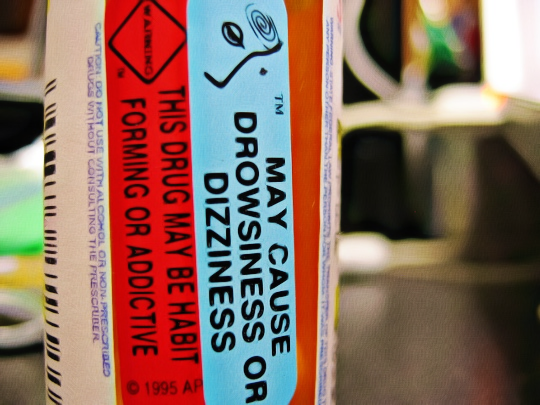What are Common Oxycodone Side Effects?
Oxycodone is a prescription medication. It can be prescribed by itself or in a combination medication with other drugs. In the U.S., some names of drugs that contain oxycodone are:
- OxyContin (extended release oxycodone)
- Roxicodone (immediate release oxycodone)
- Percocet (oxycodone and acetaminophen)
- Combunox (oxycodone and ibuprofen)
- Percodan (oxycodone and aspirin)
Oxycodone is usually prescribed for severe pain, when other pain medications either were not effective or well-tolerated. Like any prescription or over the counter (OTC) medication, oxycodone has the potential for side effects.
Side Effects of Oxycodone
Before taking the drug for the first time, it’s normal for patients to wonder, “What are the side effects of oxycodone?” Doctors will explain any possible side effects when first prescribing oxycodone. Additionally, patients should always read through any information given to them by their doctor or pharmacist.

According to the U.S. National Library of Medicine, some side effects of oxycodone are relatively mild or only last a short amount of time:
- Dry mouth
- Feeling drowsy
- Stomach pain
- Headache
- Mood changes
- Flushing (skin turns red)
- Constipation
- Feeling lightheaded or dizzy, especially when getting up from a lying position
Patients who are taking oxycodone for the first time should not drive, operate machinery, or perform any similar activities until they know how it will affect them. If any of the above side effects become severe or do not go away, the patient should contact their doctor.
Other side effects of oxycodone are more concerning but may not be an emergency. If any of the following side effects are experienced, the patient should call their doctor for further instructions:
- Nausea and vomiting
- Itching
- Inability to have or maintain an erection in men
- Irregular menstrual cycles in women
Lastly, other side effects are considered life threatening and are an emergency. If any of these side effects occur, call 911:
- Hallucinations
- Seizures
- Chest pain
- A change in heart rate
- Severe agitation
- Trouble breathing
- Difficulty swallowing
- Swelling of the face, throat, tongue, or lips
Anyone taking oxycodone may experience other side effects. If patients experience any unusual symptoms after taking oxycodone or a drug containing oxycodone, they should contact their doctor.
Long Term Side Effects of Oxycodone
In many cases, patients are prescribed oxycodone for short-term use. They may be taking it to manage severe pain following a surgery or an injury. For other patients with chronic conditions, oxycodone is taken long-term, such as for cancer.

The longer someone takes oxycodone, the more potential there is for long-term side effects:
- Drug interactions. Patients who are taking oxycodone or a drug containing oxycodone for a longer period time may forget about possible drug interactions. It is important for both the patient’s doctor and pharmacist to know that they are taking oxycodone. Patients should consult with their doctor before taking any other medication, including OTC drugs that contain pain relievers like Tylenol (acetaminophen), Motrin (ibuprofen), or Bayer (aspirin).
- Infertility. The University of Michigan reports that the long-term use of opioids, including oxycodone, can interfere with both a man’s and a woman’s ability to have children. At this time, it is not known if oxycodone-related infertility is permanent. (Oxycodone should not be taken by women who are pregnant or breastfeeding.)
- Tolerance. The longer someone takes oxycodone, the more tolerant they may become of the drug. This means they have to take a higher dose to achieve pain relief. Patients who are concerned about their tolerance to oxycodone can speak with their doctor about non-opioid drugs and/or non-medication methods of pain relief.
Anyone concerned about oxycodone long-term side effects should speak with their doctor. Oxycodone should never be stopped abruptly or discontinued without a doctor’s supervision. In most cases, oxycodone needs to be tapered down and stopped over the course of several weeks or even months.
Side Effects of Oxycodone Abuse
In addition to relieving pain, taking oxycodone can cause a feeling of euphoria or a pleasurable “high” in some people. That is why oxycodone is considered addictive and can lead to abuse and substance use disorder.
Oxycodone abuse occurs when someone doesn’t follow the prescribing directions or is using it recreationally. Signs that someone may be abusing oxycodone include:
- Taking a higher dose than what was prescribed
- Taking oxycodone more often or for a longer period of time than prescribed
- Not taking it according to directions, such as chewing or crushing extended-release tablets, or injecting the drug
- Using oxycodone without a prescription
- Stealing it from a friend or family member
- Buying it or otherwise obtaining it off the street
- Trying to obtain oxycodone from multiple doctors or pharmacies, as practice commonly known as “doctor shopping”

Perhaps the most serious side effect of oxycodone abuse is the risk of an overdose. Overdoses can happen when:
- A person is using oxycodone recreationally. If they’ve never taken an opioid before, it is possible to overdose on just one pill.
- Someone is taking more than what is prescribed, either to get high or relief pain
- A child or teenager accesses oxycodone
- An intentional overdose occurs when someone takes a large dose of oxycodone with the intent to commit suicide.
Someone who has taken too much oxycodone may experience the following symptoms:
- Breathing changes, including difficulty breathing, slowed or stopped breathing
- Being weak or limp
- Excessive drowsiness
- Loss of consciousness
- Cold or clammy skin
- Pupils may narrow or widen
If an oxycodone overdose is suspected, call 911 immediately. Administer naloxone if it is available.
When someone is addicted to oxycodone, they may feel like they have lost control over their life. They will continue taking oxycodone despite the drug causing problems in their life. While not physical in nature, these difficulties can also be considered “side effects” of oxycodone abuse:
- Experiencing legal trouble or being arrested
- Having difficulty keeping or getting a job
- Using oxycodone when it is not safe to do so, such as at work or before driving
- Neglecting family obligations
- Spending money on oxycodone that should have gone for necessities like food or rent
- Unsuccessfully attempting to quit oxycodone
No matter how a person obtains oxycodone, either through a doctor or illicitly, it should never be stopped abruptly. Oxycodone is a powerful drug that must be tapered down, and should be done so under the direction and supervision of medical professionals.
Sources:
General information:
https://medlineplus.gov/druginfo/meds/a682132.html#side-effects
https://www.hopkinsmedicine.org/opioids/signs-of-opioid-abuse.html
Long-term side effects and fertility:
https://www.uofmhealth.org/health-library/d00329a1
Addiction:
https://medlineplus.gov/genetics/condition/opioid-addiction/
https://medlineplus.gov/opioidmisuseandaddiction.html
“In the U.S., drugs that are oxycodone or contain oxycodone include:”
https://www.healthline.com/health/pain-relief/oxycodone-vs-oxycontin#sidebyside
https://www.healthline.com/health/oxycodone-vs-percocet
https://www.drugs.com/combunox.html

